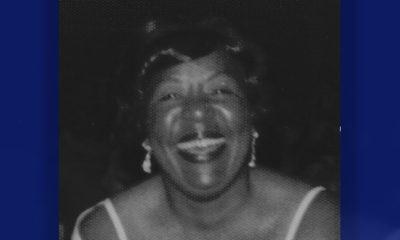Black History
Thousands Celebrate D.C. Emancipation Day
THE AFRO — April 16, 1862 was the official date that slavery was abolished in Washington, D.C. As a result of President Abraham Lincoln’s Compensated Emancipation Act of 1862, over 3,100 slaves were freed in D.C.
By George Kevin Jordan
It may have been overcast during most of Saturday, but that didn’t seem to damper the spirits of the thousands of people who gathered at the Freedom Plaza to celebrate the 157th anniversary of Emancipation Day in Washington, D.C. The event was filled with music, food and fireworks, as residents throughout the DMV came to celebrate the historic day.
The streets were closed off along Pennsylvania Avenue as people took in the music, swaying as D.C. natives such as Kenny Lattimore and Mya, serenaded them or jumping into a groove when Go-go music blasted through the speakers.
April 16, 1862 was the official date that slavery was abolished in Washington, D.C. As a result of President Abraham Lincoln’s Compensated Emancipation Act of 1862, over 3,100 slaves were freed in D.C.
“That’s not the end and that’s not also the beginning of our true history, but it is something to be acknowledged because there’s so many ancestors that fought a fight, that we don’t quite understand because we haven’t fought it like they did,” D.C.’s hometown singer Mya told the AFRO.
According to the Emancipation Day site, the first Emancipation Parade was held April 19, 1866, four years after the D.C. Emancipation Act. Many celebrated along Pennsylvania Avenue then as well.
This year’s parade, which started in the afternoon along Pennsylvania Avenue dropped off participants at the Freedom Plaza, the epicenter of most of the events. Local, regional and national artists such as Faith Evans and Doug E. Fresh were on hand as part of the day long concert series.
The parade, concert and fireworks was the culmination of several Emancipation Day Events including the displaying of the Emancipation Act on Monday, and a lunch and learn of the history of the day on Friday.
“I think it’s an important event,” said Paula Moore a Maryland resident, who has been attending the celebration for years. “So we bring our kids so they understand the importance of Emancipation Day in D.C.”
“They’re still young and they’re trying to embrace what it means. Not only are we telling them about history but it’s also equally important to know the artists who brought us along the way. It’s not only about looking back it’s about making improvements as we move forward.”
Moore pointed out the importance of celebrating events for and about Black people saying, “So much of what we’ve (Black people) done and meant to D.C. is being erased and so its so important to continue to show up and support events like this. Without events like this we’re completely erased.”
Omeshia Herring, a D.C. resident came to connect with the District’s rich culture. “I am not from D.C., but I moved here and I think it’s important to immerse yourself into the culture and this is the celebration of the end of slavery in D.C. so why wouldn’t I be here? I’m happy to see all the beautiful Black people.”
Herring, who has been living in D.C. for seven years and resides in the Northeast, said that events like the Emancipation Day Celebration are, “extremely important and rare.”
“I think it’s important for our fellow counterparts to come out and enjoy the rich history of Washington,” Herring told the AFRO.
This year’s attendance numbers could not be confirmed at press time, however the Office of Cable, Television Film, Music and Entertainment did confirm that attendance for the concert last year was about 4,000 people. For more information on remaining events and a snapshot of the history of the day go to https://emancipation.dc.gov/.
This article originally appeared The Afro.
Activism
Oakland Post: Week of November 26 – December 2, 2025
The printed Weekly Edition of the Oakland Post: Week of November 26 – December 2, 2025

To enlarge your view of this issue, use the slider, magnifying glass icon or full page icon in the lower right corner of the browser window.
Activism
Oakland Post: Week of November 19 – 25, 2025
The printed Weekly Edition of the Oakland Post: Week of November 19 – 25, 2025

To enlarge your view of this issue, use the slider, magnifying glass icon or full page icon in the lower right corner of the browser window.
Activism
IN MEMORIAM: William ‘Bill’ Patterson, 94
Bill devoted his life to public service and education. In 1971, he became the founding director for the Peralta Community College Foundation, he also became an administrator for Oakland Parks and Recreation overseeing 23 recreation centers, the Oakland Zoo, Children’s Fairyland, Lake Merritt, and the Henry J. Kaiser Convention Center.

William “Bill” Patterson, 94, of Little Rock, Arkansas, passed away peacefully on October 21, 2025, at his home in Oakland, CA. He was born on May 19, 1931, to Marie Childress Patterson and William Benjamin Patterson in Little Rock, Arkansas. He graduated from Dunbar High School and traveled to Oakland, California, in 1948. William Patterson graduated from San Francisco State University, earning both graduate and undergraduate degrees. He married Euradell “Dell” Patterson in 1961. Bill lovingly took care of his wife, Dell, until she died in 2020.
Bill devoted his life to public service and education. In 1971, he became the founding director for the Peralta Community College Foundation, he also became an administrator for Oakland Parks and Recreation overseeing 23 recreation centers, the Oakland Zoo, Children’s Fairyland, Lake Merritt, and the Henry J. Kaiser Convention Center.
He served on the boards of Oakland’s Urban Strategies Council, the Oakland Public Ethics Commission, and the Oakland Workforce Development Board.
He was a three-term president of the Oakland branch of the NAACP.
Bill was initiated in the Gamma Alpha chapter of Kappa Alpha Psi Fraternity.
In 1997 Bill was appointed to the East Bay Utility District Board of Directors. William Patterson was the first African American Board President and served the board for 27 years.
Bill’s impact reached far beyond his various important and impactful positions.
Bill mentored politicians, athletes and young people. Among those he mentored and advised are legends Joe Morgan, Bill Russell, Frank Robinson, Curt Flood, and Lionel Wilson to name a few.
He is survived by his son, William David Patterson, and one sister, Sarah Ann Strickland, and a host of other family members and friends.
A celebration of life service will take place at Henry J. Kaiser Convention Center (Calvin Simmons Theater) on November 21, 2025, at 10 AM.
His services are being livestreamed at: https://www.facebook.com/events/1250167107131991/
In lieu of flowers, donations can be made to the Euradell and William Patterson scholarship fund TBA.

-

 Activism3 weeks ago
Activism3 weeks agoOakland Post: Week of November 12 – 18, 2025
-

 Activism4 weeks ago
Activism4 weeks agoOakland Post: Week of November 5 – 11, 2025
-

 Activism2 weeks ago
Activism2 weeks agoIN MEMORIAM: William ‘Bill’ Patterson, 94
-

 Activism3 weeks ago
Activism3 weeks agoHow Charles R. Drew University Navigated More Than $20 Million in Fed Cuts – Still Prioritizing Students and Community Health
-

 Bay Area3 weeks ago
Bay Area3 weeks agoNo Justice in the Justice System
-

 #NNPA BlackPress3 weeks ago
#NNPA BlackPress3 weeks agoThe Perfumed Hand of Hypocrisy: Trump Hosted Former Terror Suspect While America Condemns a Muslim Mayor
-

 #NNPA BlackPress2 weeks ago
#NNPA BlackPress2 weeks agoTrump’s Death Threat Rhetoric Sends Nation into Crisis
-

 #NNPA BlackPress4 weeks ago
#NNPA BlackPress4 weeks agoProtecting Pedophiles: The GOP’s Warped Crusade Against Its Own Lies
























































1 Comment